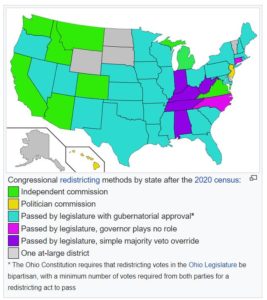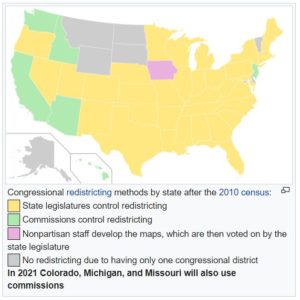By Elliott Brack
Editor and Publisher, GwinnettForum
JAN. 21, 2022 | The Washington columnist Helen Cox Richardson wrote on January 18: “Voter fraud is about an individual breaking the law and is almost always caught. It is not a threat to democracy. Election fraud means that people in power have rigged the system so that the will of the voters is overturned. When it happens, it threatens to destroy our nation.”
![]() We seldom see voter fraud, where some individual is caught trying to vote twice, or vote by another name. There’s a lot of talk about it, but few convictions.
We seldom see voter fraud, where some individual is caught trying to vote twice, or vote by another name. There’s a lot of talk about it, but few convictions.
Now election fraud: That’s another matter altogether, and much more commonplace.
By what other name can we call election fraud? One word is “gerrymandering,” where a state controlled by a single party, and no matter what the party, passes rules so that their buddies in office can stay in office. They redraw election districts making it near impossible for the party out of power to win. And instead of getting reasonable and compact districts, the format of the district looks something like a Rorschach test than a simple homogeneous district.

Congressional redistricting methods by state after the 2020 census. Map and information via Wikipedia.org
While gerrymandering may last forever in some places, we now find that there is an intelligent way to solve this problem, but one that does not get used often. That’s because the politicians controlling the various states are greedy, and try to ensure that they stay in power by manipulating the district lines so strongly.
The alternative is what some states now call an “Independent Redistricting Commission.”
At present, 21 U.S. states have some form of non-partisan or bipartisan redistricting commission. Of these 21 states, 13 use redistricting commissions to exclusively draw electoral district boundaries.
A redistricting commission is a body, other than the usual state legislatures, established to draw electoral district boundaries. Generally the intent is to avoid gerrymandering, or at least the appearance of gerrymandering, by specifying a nonpartisan or bipartisan body to comprise the commission drawing district boundaries.
Only eight states have what might be called a “pure” independent commission: Washington, California, Montana, Idaho, Colorado, Arizona, Michigan and Virginia. (See the basically blue-green map.) Note that four states, Wyoming, North Dakota, South Dakota and Vermont) have only one representative in the U.S. House of Representatives. They don’t have to worry about redistricting.)

Congressional redistricting methods by state after 2010 census. Map and information via Wikipedia.org.
In the majority of the states (as seen in the map adjacent which is predominately yellow), redistricting is controlled by the state legislature. Generally that means that whoever is in control after the 2020 election, will work prodigiously to ensure that there is no loss to their party in representatives to the Congress and in state legislatures.
There was a major change recently in Michigan. This came about through a citizen ballot initiative that allowed for the creation of an independent commission to draw the boundaries of the Congressional districts. The commission was composed of Democrats, Republicans and independents.
How they finally agreed on what most think is a redistricting that is fair is the big question. We doubt that will happen in Georgia, since whichever party is in control, will not want to give up this control and allow any other group to draw those powerful lines.
By the way, all this started in Michigan with a Facebook post from a woman with no political experience. Happen in Georgia? We doubt it. But who’s to say?
We repeat from above: “Election fraud means that people in power have rigged the system so that the will of the voters is overturned. When it happens, it threatens to destroy our nation.”
- Have a comment? Send to: elliott@brack.net









Follow Us